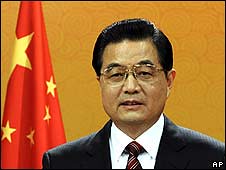
President and CPC Chairman of the People's Republic of China, Hu Jintao, has visited Africa and pledged greater cooperation between the PRC and the continent. The PRC maintains good relations with the Republic of South Africa., a photo by Pan-African News Wire File Photos on Flickr.
U.S. eyes testy China talks, Chen backer expects Chinese decision
9:29pm EDT
By Aruna Viswanatha and Paul Eckert
WASHINGTON
(Reuters) - The United States faces a tense week in China as high-level talks on trade and global hot spots like Iran and North Korea open in the shadow of a blind Chinese activist's bold escape from house arrest to seek U.S. protection in Beijing.
The trip to Beijing would have been challenging for Secretary of State Hillary Clinton and Treasury Secretary Timothy Geithner even without a human rights dispute over Chen Guangcheng, who a U.S.-based group says is hiding in the U.S. Embassy in Beijing.
The May 3-4 Strategic & Economic Dialogue is the last of such annual consultations before political seasons heat up in the United States and China, giving leaders in both countries less flexibility over contentious economic and security issues.
The United States goes into full campaign mode for the November presidential election, while China's ruling Communist Party enters a leadership transition in the fall that has been complicated by a scandal that toppled senior leader Bo Xilai.
Bob Fu, whose religious and political rights advocacy group ChinaAid is the chief source of information about Chen, said he had confirmed "intensive talks" between the United States and China began right after the activist took shelter in the embassy on Friday.
"I was told the Chinese top leaders have been deliberating a decision to be made very soon," Fu said on Sunday by telephone from Texas. A "Chinese official response (is) expected in the next day or so," he added.
The United States has not confirmed reports that Chen, who slipped away from under heavy surveillance around his village home in eastern Shandong province, fled into the U.S. Embassy. China has also declined public comment on Chen's reported escape.
Fu said he got his information from "both sides" in the talks over Chen's fate. The State Department would not comment.
The New York Times, however, reported that Kurt Campbell, an assistant secretary of state for East Asian and Pacific Affairs, arrived in Beijing on Sunday for talks about Chen, citing unidentified officials in Washington and Beijing. The newspaper said the senior diplomat was photographed in a Marriott hotel.
Chen, a self-schooled legal advocate who campaigned against abortions forced under China's "one child" policy, had been held under extra-legal confinement in his village home in Linyi since September 2010 when he was released from jail.
NORTH KOREA, IRAN LOOM
Washington and Beijing both confirmed on Saturday that the high-level talks would proceed as scheduled, which analysts said indicated efforts to contain fallout from Chen on the larger relationship.
"It is feasible that this will become a very big deal with major negative impact on U.S.-China relations, but it is also feasible and far preferable that this be able to be negotiated quickly and quietly," Kenneth Lieberthal, director of the John L. Thornton China Center at the Brookings Institution.
The United States seeks more Chinese support in dealing with the nuclear proliferation challenges of Iran and North Korea.
Most experts believe North Korea is preparing for a third nuclear test, in defiance of a raft of U.N. sanctions and pressure from Beijing to desist. In Iran's case, Washington wants Beijing's cooperation on cutting oil imports from Tehran, an important energy source for China.
China has been concerned about the Obama administration strategy of rebalancing its military forces to the Asia-Pacific region, under which the United States has strengthened security ties to treaty allies Australia, the Philippines and Japan.
Underscoring those deepening ties, President Barack Obama hosts Japanese Prime Minister Yoshihiko Noda at the White House on Monday, the same day that Clinton and Defense Secretary Leon Panetta host their counterparts from the Philippines.
Noda arrives in Washington days after the United States and Japan revised plans to reorganize and streamline U.S. bases on the Japanese island of Okinawa, allowing the allies to move toward closer military cooperation in the region.
The Philippine Foreign Affairs Secretary Albert Del Rosario and Defense Secretary Voltaire Gazmin come to the United States amid tensions with China over a South China Sea territorial dispute. Philippine and Chinese ships have faced off near the Scarborough Shoal in waters believed to be rich in oil and gas.
More U.S.-China friction could be in store, as supporters of Taiwan in the U.S. Congress have renewed pressure on the Obama administration to sell new F-16s to the self-ruled island, which Beijing claims as part of the sovereign territory on China.
Obama's presumptive Republican challenger in November's election, Mitt Romney, has painted Obama as weak on China.
In a statement on Chen on Sunday, Romney avoided criticism of Obama's handling of the delicate case, but said: "Any serious U.S. policy toward China must confront the facts of the Chinese government's denial of political liberties, its one-child policy, and other violations of human rights."
Lieberthal, who was a top Asia adviser in the Bill Clinton administration, said U.S. diplomats have long struggled to handle human rights cases while pursuing other important American interests with China.
"The reality is your ability to work with the Chinese on a whole series of major U.S. equities is adversely affected if you make the focus of U.S. policy an individual case of a dissident," he said.
(Editing by Doina Chiacu)
No comments:
Post a Comment